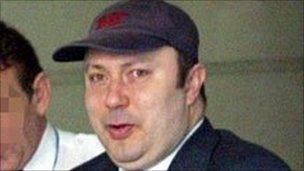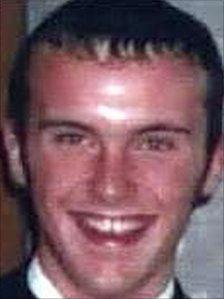Limbs-in-loch killer William Beggs claims damages
- Published

William Beggs was jailed for life in October 2001
The man convicted of the "limbs-in-the-loch" murder of a teenager in East Ayrshire is taking a claim for damages to the European Court of Human Rights.
William Beggs is seeking up to 16,000 euros in compensation over claims the legal process in Scotland has taken too long to hear his unsuccessful appeals.
The 47-year-old was found guilty of killing and dismembering Barry Wallace in Kilmarnock in 1999.
The 18-year-old's remains were found in Loch Lomond and on a beach near Troon.
Supermarket worker Mr Wallace vanished on 5 December 1999, after a Christmas night-out with colleagues in his home town of Kilmarnock. He was last seen in the town centre.
A jury found Beggs took the teenager to his flat and subjected him to a serious sexual assault. He then murdered him and cut up his body.
Minimum term
The killer dumped Mr Wallace's limbs and torso in Loch Lomond and his head in the sea off the Ayrshire coast.
Shortly after the crime, Beggs fled to the Netherlands. After lengthy extradition proceedings, in January 2001 he was ordered to be returned to Scotland to face trial.

Beggs killed and dismembered 18-year-old Barry Wallace
Beggs was convicted of the murder and ordered to serve a minimum of 20 years in prison.
The killer, however, has launched several unsuccessful attempts to have the conviction overturned on the grounds that he had not received a fair trial and consequently suffered a miscarriage of justice.
In September 2009, a full appeal got under way in which Beggs said "prejudicial" publicity had affected the outcome of his 2001 trial.
However, when that appeal was turned down in March last year, Beggs, originally from Northern Ireland, sought leave to appeal to the Supreme Court.
That application was refused by the Court of Criminal Appeal in May.
Beggs then made a direct application himself to the Supreme Court for special leave to appeal. That was rejected in December.
It was expected that Beggs would mount a challenge on Tuesday to the ruling of trial judge Lord Osborne that he could not apply for parole for 20 years.
However, it has now emerged that he wants the European Court of Human Rights in Strasbourg to consider his case.
Beggs claims that the legal process in Scotland has taken too long and that the delay breaches article six of the European Convention on Human Rights.
He is also due back before appeal judges in Edinburgh soon in another attempt to have his minimum sentence cut.
He has dropped his claim that Lord Osborne's 20 year minimum sentence was excessive, but instead will be asking for "a discount" to compensate for his long wait.
- Published22 December 2010